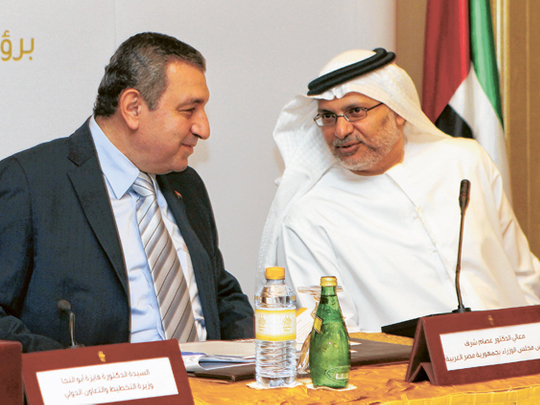
Abu Dhabi: Egypt is seeking to raise $3 billion (Dh11.01 billion) to finance its budget deficit for the 2011-12 financial year, its Finance Minister Samir Radwan said on Monday.
"We have a budget deficit amounting to 8.6 per cent of the gross domestic product or 134 billion Egyptian pounds. Some 120 billion pounds will be financed from the local market, while the remaining 14 billion pounds or roughly $3 billion will be funded with the help of Arab Gulf countries," Radwan told reporters ahead of a meeting with Emirati businessmen.
He added that Saudi Arabia has offered $500 million, while Qatar was considering offering a similar amount.
Radwan said Prime Minister Essam Sharaf's visit to the UAE was meant to resolve problems faced by Emirati businessmen in Egypt, seek the UAE's help in removing economic bottlenecks and invite more investment in Egypt.
Speaking at the meeting, Dr Anwar Mohammad Gargash, UAE Minister of State for Foreign Affairs, urged Egypt to remove all obstacles faced by Emirati businessmen in Egypt.
He informed the meeting that UAE-Egypt trade grew to $1.17 billion last year and that Emirati investments were $4.5 billion.
Sharaf vowed that every effort will be made to remove all such obstacles.
"Contracts signed by Emirati businessmen in Egypt might have flaws, but businessmen have nothing to do with these flaws," Sharaf said.
Analysts said the UAE and other Gulf countries should take the initiative to help Egypt's economy recover, analysts said yesterday.
"Although GCC member countries are very concerned about Egypt's new foreign policy towards Iran, they should take the initiative to back Egypt's economy, so that no foreign powers and especially Iran are allowed to jump in and make inroads into Egypt," Dr Ebtisam Al Kitbi, professor of political science at the UAE University, said.
Dr Ebtisam said Egypt, which is currently facing economic turmoil in the wake of the Egyptian revolution, which has deterred tourists and foreign investors, is in a pressing need of the Gulf support.
"Gulf policymakers should not wait until the fluid situation in Egypt stabilises. They should be pro-active and have different scenarios for whatever regime Egpt has after the parliamentary and presidential elections scheduled for September.
Egypt's 18-day revolt that toppled Mubarak's regime on February 11 halted new foreign investment and decimated the tourist industry. Annual growth slowed to less than 2 per cent from a projected 5 per cent, and hard currency reserves plunged 25 per cent.
Dr Ebtisam said the Gulf countries are also concerned about the Muslim Brotherhood's possible dominance in the elections.
The International Monetary Fund (IMF) agreed to a $3 billion financing deal with Egypt and praised the policies of an interim government struggling to stabilise the economy, but the ruling military council rejected the move.
It also stopped negotiating a loan deal with the World Bank because the interim government's spending plans had been cut. "So we do not need to go at this stage to the Bank and the Fund," said Radwan.
Egypt has been seeking funds to plug an estimated $11 billion balance of payments gap in the wake of the upheaval.
The government last week approved a budget for the 2011-12 financial year that increases spending by a quarter, partly to help the poor.
"The authorities' economic programme is a first step to laying the foundation for a more inclusive private sector-led economic growth," the IMF said in a statement.












